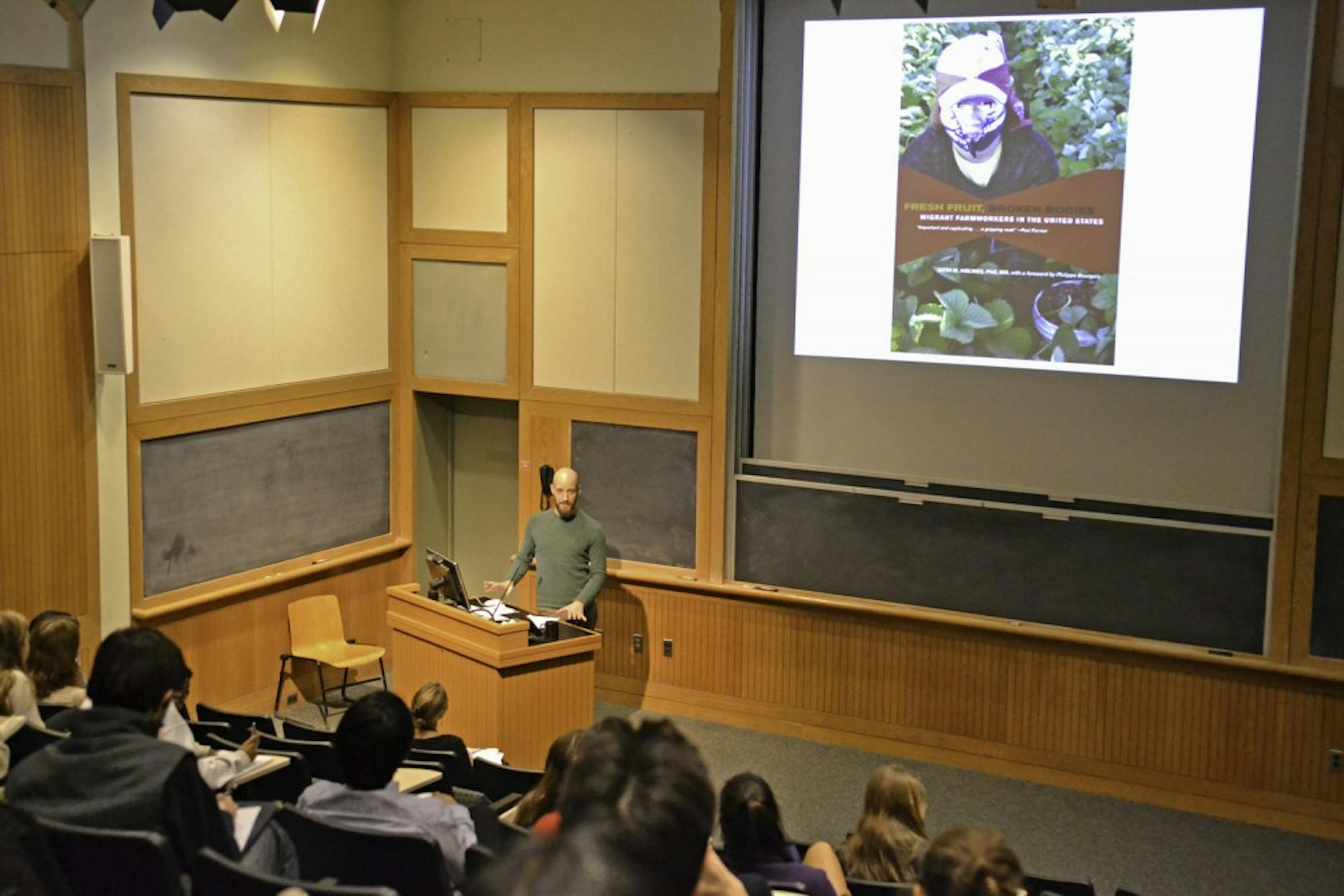For few academics does the term “fieldwork” entail working in an actual field. Seth Holmes, in contrast to many of his colleagues, spent months working with indigenous Mexican migrant farmers as he conducted research for his 2013 book “Fresh Fruit, Broken Bodies: Migrant Farmworkers in the United States.”
In his lecture yesterday, also titled “Fresh Fruit, Broken Bodies,” Holmes, a medical anthropologist and professor of health and social behavior at the University of California at Berkeley, enumerated the ways in which he believes institutionalized social structures and hierarchies produce poor health effects among populations of indigenous Mexican migrant workers.
Holmes called his research a “transnational” project, as he traveled with indigenous Mexican migrant workers seeking employment from Oaxaca, Mexico and up the West Coast. He lived and worked on a farm in Washington, where he spent one or two days picking berries each week. When he wasn’t picking berries, he accompanied migrant farmers to health facilities and interviewed doctors, nurses and nearby residents.
From his field research, Holmes identified the poor health outcomes in the area and their disproportional effect on migrant populations. He noted, for example, that the occupational death rate for migrant farmers is five times the national average and only about five percent of migrant farmers have health insurance.
Holmes’ termed the myriad health problems due to strained working conditions as a “slow death” of the migrant farmers. At the berry farm, workers are required to present 50 pounds of de-leafed berries every hour. To meet these demands, Holmes said, pickers work from sunrise to the late afternoon with few or no breaks, often failing to stop even for water. He observed that workers are exposed to chronic pesticide usage, heat exposure and dangerous machinery.
During the lecture Holmes showed a picture of a sign cautioning the presence of dangerous pesticides posted in English around the labor camp.
He said that while he noted that there were patches of pesticides on the strawberry plants, the berry-pickers continued to work without gloves and often ended the day with their hands stained dark maroon from the chemicals.
If workers do stop for lunch, Holmes said, they often eat in the fields without washing their hands.
Holmes said that clinics are poorly funded and inaccessible to migrant workers, adding that the chronic pains of workers’ physical labor are silenced by social conditions that have naturalized a hierarchy of suffering.
In what he views as institutionalized racism, indigenous Mexican bodies are thought to naturally be berry pickers.
He said, for example, the indigenous Triqui group conforms to the stereotype that they are too short and too slow for apple picking, the more profitable enterprise, making them instead more biologically suited for berry-picking.
“The indigenous Mexican migrant body is made to betray itself,” Holmes said.
In an attempt to effect positive change, Holmes highlighted an academic project to “denaturalize” social inequalities
He simultaneously stressed the importance of policy and activist efforts to increase health and medical education, change violent immigration procedures and encourage collective action against these systems of abuse.
Exercising informed consumer choice, Holmes’s noted, is not straightforward and in many cases goes against intuition. Whereas many endorse buying organic, recent data suggests small and local farms treat their workers even worse than corporate ones, he said.
Accounting for labor practices is less straight-forward than pesticide usage and it is difficult to streamline standards for labeling. New labeling initiatives are emerging, however, such as an equitable food initiative at Costco that labels products with concern to labor standards and working participation.
Yingna Wang ’17 said that the talk encouraged her to think more critically about her role as a consumer, especially when buying fruit or produce.
Many students who attended the afternoon lecture did so as part of a current course being offered on HIV/AIDS from a bio-social perspective through the College Courses program.
Edom Wessenyeleh ’17, who is currently enrolled in the course, said that Holmes’ physical participation in the plight of migrant workers offered an insightful perspective.
“From the ground to policy, all fields are relevant and through their collaboration can make a difference,” she said.
The lecture was co-sponsored by the anthropology department, the Dickey Center and the Rockefeller Center. Over 50 people were in attendance.




